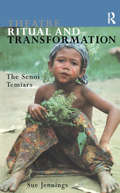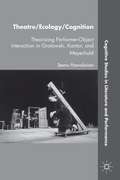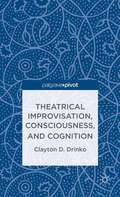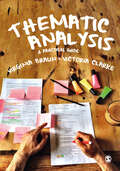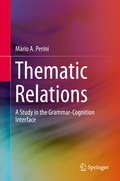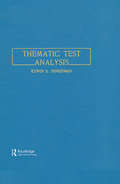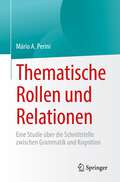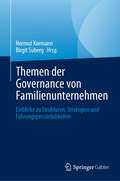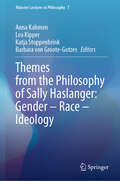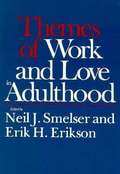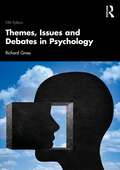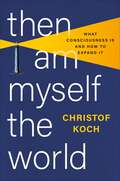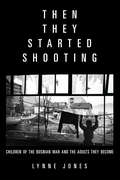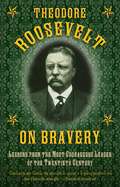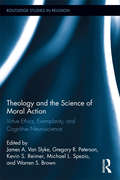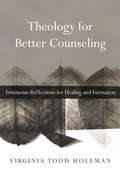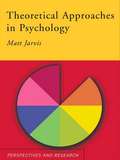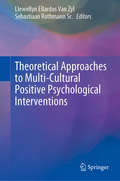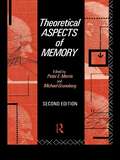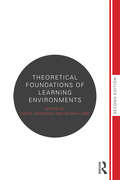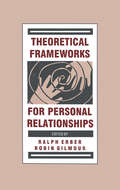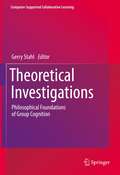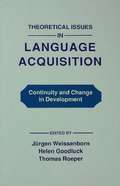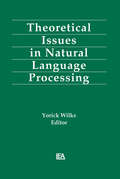- Table View
- List View
Theatre, Ritual and Transformation: The Senoi Temiars
by Sue JenningsSue Jennings and her three children spent two years on a fieldwork expedition to the Senoi Temiar people of Malaysia: Theatre, Ritual and Transformation is a fascinating account of that experience. She describes how the Temiar regularly perform seances which are enacted through dreams, dance, music and drama, and explains that they see the seance as playing a valuable preventative role in people's lives, as well as being a medium of healing and cure. Her account brings together the insights of drama, therapy and theatre with those of social anthropology to provide an invaluable theoretical framework for understanding theatre and ritual and their links with healing.
Theatre/Ecology/Cognition
by Teemu PaavolainenHow is performer-object interaction enacted and perceived in the theatre? How thereby are varieties of 'meaning' also enacted and perceived? Using cognitive theory and ecological ontology, Paavolainen investigates how the interplay of actors and objects affords a degree of enjoyment and understanding, whether or not the viewer speaks the language.
Theatrical Improvisation, Consciousness, and Cognition
by Clayton D. DrinkoImprovisation teachers have long known that the human mind could be trained to be effortlessly spontaneous and intuitive. Drinko explores what these improvisation teachers knew about improvisation's effects on consciousness and cognition and compares these theories to current findings in cognitive neuroscience, psychology, and philosophy.
Thematic Analysis: A Practical Guide
by Victoria Clarke Virginia Braun**Winner of the 2022 British Psychological Society Book Award - Textbook Category** Developed and adapted by the authors of this book, thematic analysis (TA) is one of the most popular qualitative data analytic techniques in psychology and the social and health sciences. Building on the success of Braun & Clarke′s 2006 paper first outlining their approach - which has over 100,000 citations on Google Scholar - this book is the definitive guide to TA, covering: - Contextualisation of TA - Developing themes - Writing TA reports - Reflexive TA It addresses the common questions surrounding TA as well as developments in the field, offering a highly accessible and practical discussion of doing TA situated within a clear understanding of the wider terrain of qualitative research. Virginia Braun is a Professor in the School of Psychology at The University of Auckland, Aotearoa New Zealand. Victoria Clarke is an Associate Professor in Qualitative and Critical Psychology in the Department of Social Sciences at the University of the West of England (UWE), Bristol.
Thematic Analysis: A Practical Guide
by Victoria Clarke Virginia Braun**Winner of the 2022 British Psychological Society Book Award - Textbook Category** Developed and adapted by the authors of this book, thematic analysis (TA) is one of the most popular qualitative data analytic techniques in psychology and the social and health sciences. Building on the success of Braun & Clarke′s 2006 paper first outlining their approach - which has over 100,000 citations on Google Scholar - this book is the definitive guide to TA, covering: - Contextualisation of TA - Developing themes - Writing TA reports - Reflexive TA It addresses the common questions surrounding TA as well as developments in the field, offering a highly accessible and practical discussion of doing TA situated within a clear understanding of the wider terrain of qualitative research. Virginia Braun is a Professor in the School of Psychology at The University of Auckland, Aotearoa New Zealand. Victoria Clarke is an Associate Professor in Qualitative and Critical Psychology in the Department of Social Sciences at the University of the West of England (UWE), Bristol.
Thematic Relations: A Study in the Grammar-Cognition Interface
by Mário A. PeriniThis book presents a proposal to better define thematic relations by exploring the relation between language and cognition. It analyzes the relation between grammatically defined roles such as agent and patient (semantic roles), and elaborate thematic relations (ETRs) actually accessible to language users. It shows that many phenomena previously analyzed as grammatical can be described in a more simple and convenient way by postulating direct connection between syntactic complements and cognitive relations present in the schema evoked by the verb. The volume focuses on a topic which has been the object of much discussion in the recent literature, namely the definition and delimitation of semantic roles, proposing new solutions to some important theoretical and practical problems in the description of the lexicogrammatical structure of languages, and in particular of verb valency. It shows that in many cases a direct relation can be established between morphosyntactic units and functions, on one hand, and ETRs, on the other, without the intermediation of grammatically defined semantic roles. This makes it possible to analyze thematic relations that have been traditionally problematic, such as the patient, in a linguistically simple and cognitively well-motivated way. Thematic Relations – A Study in the Grammar-Cognition Interface will be a useful resource for practicing linguists working on the analysis of natural languages, in particular on verb valency; verb subcategorization and thematic structure; semantic (thematic) roles, their definition and syntactic coding; the relation between grammatical structure and cognitive schemata (frames); and the structure of the lexicon.
Thematic Test Analysis
by E. S. ShneidmanFirst published in 1988. This book is the result of the attempt to work up a single clinical case in terms of all the published methods for thematic test analysis and of the realization that no one can present a system of interpretation better than the person who designed it; thus the several thematic methods, each presented by its own author. The primary purpose has always been to furnish the interested reader with a comprehensive manual showing the various methods of thematic test analysis in operation on the same case.
Thematische Rollen und Relationen: Eine Studie über die Schnittstelle zwischen Grammatik und Kognition
by Mário A. PeriniDieses Buch präsentiert einen Vorschlag zur besseren Definition thematischer Beziehungen, indem es die Beziehung zwischen Sprache und Kognition untersucht. Es analysiert die Beziehung zwischen grammatisch definierten Rollen wie Agent und Patient (semantische Rollen) und elaborierten thematischen Relationen (ETRs), die den Sprachbenutzern tatsächlich zugänglich sind. Es wird gezeigt, dass viele Phänomene, die zuvor als grammatikalisch analysiert wurden, auf einfachere und bequemere Weise beschrieben werden können, indem eine direkte Verbindung zwischen syntaktischen Ergänzungen und kognitiven Beziehungen, die in dem durch das Verb hervorgerufenen Schema vorhanden sind, postuliert wird. Der Band konzentriert sich auf ein Thema, das in der jüngeren Literatur viel diskutiert wurde, nämlich die Definition und Abgrenzung semantischer Rollen, und schlägt neue Lösungen für einige wichtige theoretische und praktische Probleme bei der Beschreibung der lexikogrammatischen Struktur von Sprachen und insbesondere der Verbvalenz vor. Es wird gezeigt, dass in vielen Fällen eine direkte Beziehung zwischen morphosyntaktischen Einheiten und Funktionen einerseits und ETRs andererseits hergestellt werden kann, ohne die Vermittlung von grammatisch definierten semantischen Rollen. Dadurch wird es möglich, traditionell problematische thematische Relationen, wie z.B. den Patienten, auf linguistisch einfache und kognitiv gut motivierte Weise zu analysieren. Thematische Beziehungen - Eine Studie über die Schnittstelle zwischen Grammatik und Kognition ist ein nützliches Hilfsmittel für Linguisten, die sich mit der Analyse natürlicher Sprachen beschäftigen, insbesondere mit der Valenz von Verben, der Subkategorisierung von Verben und der thematischen Struktur, den semantischen (thematischen) Rollen, ihrer Definition und syntaktischen Kodierung, der Beziehung zwischen grammatischer Struktur und kognitiven Schemata (Frames) und der Struktur des Lexikons.
Themen der Governance von Familienunternehmen: Einblicke zu Strukturen, Strategien und Führungspersönlichkeiten
by Hermut Kormann Birgit SubergDieses Buch konzentriert sich auf die Rolle des Beirats oder ähnlicher Governance-Gremien in Familienunternehmen und speziell auf Prozesse und Themen von strategischer Bedeutung. Es umfasst alle relevanten Themen, die regelmäßig behandelt werden müssen, wie Strategieentwicklung, Finanzmanagement und Führung. Zu jedem Thema werden die Vor- und Nachteile herausgearbeitet. Dies ist eines der wenigen Bücher, das sich mit Familienunternehmen befasst, von den Governance-Systemen bis hin zur Rolle der Führungskräfte. Die von den Autoren sorgfältig gesammelten Beispiele und die eingehende Diskussion der Themen bieten dem Leser wertvolle Einblicke, um die Wirksamkeit der Unternehmensführung zu bereichern.
Themes from the Philosophy of Sally Haslanger: Gender – Race – Ideology (Münster Lectures in Philosophy #7)
by Anna Kahmen Barbara von Groote-Gotzes Lea Kipper Katja StoppenbrinkThis book offers a critical discussion of Sally Haslanger's philosophical oeuvre. Published on the occasion of the annual Münster Lectures in Philosophy held by Prof. Haslanger in the winter of 2019, it covers both her prominent work on the themes of gender, race, and ideology, as well as her research on social practices and social structures. Conceptual, methodological, practical as well as normative approaches are pursued to more closely understand Sally Haslanger’s claims, arguments, and discursive goals. The direct correspondence between Sally Haslanger and her interlocutors makes this a very unique book suitable for both advanced scholars as well as graduate students.
Themes of Work and Love in Adulthood
by Erik H. Erikson Neil J. SmelserTo love and to work, Freud's famous definition of psychological maturity becomes the focusing principle for renewed examination of dominant themes that play themselves in adult life. Leading experts explore the states and crises adults pass through.
Themes, Issues and Debates in Psychology
by Richard GrossThemes, Issues and Debates in Psychology presents an integrated view of Psychology by identifying underlying themes (such as the scientific nature of Psychology, cultural and gender differences), issues (ethical, methodological and conceptual), and debates (such as heredity vs. environment, free will vs. determinism, normality vs. abnormality) which permeate the discipline as a whole. The text adopts a critical approach to ‘mainstream Psychology’, attempting to identify and challenge some of the underlying assumptions that are traditionally made about ‘human nature’ and how it can be investigated in ways based on the scientific study of the natural world. What makes Psychology unique is the view of Psychologists as part of their own subject-matter: trying to study other people cannot be done by copying the methods of the physicist or chemist. Psychology draws on and brings together a number of different theories and methodologies from a wide range of other disciplines, including philosophy, biology, anthropology and sociology. Themes, Issues and Debates in Psychology also includes chapters on Parapsychology, Positive Psychology and Religion and Spirituality, which are rarely found together in a single text. Not only are these not mainstream, but they highlight some of the themes, issues and debates discussed in earlier chapters. The topics in this fifth edition of this book are inflected by a new concern with decolonizing the curriculum, and discussions of cultural and gender-based issues are integrated into all aspects of the text to offer a new and critical perspective on issues such as political and scientific colonialism. Additionally, the text features ‘Question Time’ breaks that relate to methodological, theoretical and other issues; these are all aimed at helping the reader assimilate the material. Some of the issues raised could form the basis of seminar papers/discussions. Themes, Issues and Debates in Psychology is ideal reading for all students and is relevant to undergraduate courses in psychology.
Then I Am Myself the World: What Consciousness Is and How to Expand It
by Christof Koch"Deeply personal and infinitely digestible, Then I Am Myself the World is a remarkable must-read for anyone interested in knowing their mind.&”―Judson Brewer MD, PhD, New York Times–bestselling author of Unwinding Anxiety The world&’s leading investigator of consciousness argues that by understanding what consciousness does—cause change in the world—we can understand its origins and its future In Then I Am Myself the World, Christof Koch explores the only thing we directly experience: consciousness. At the book&’s heart is integrated-information theory, the idea that the essence of consciousness is the ability to exert causal power over itself, to be an agent of change. Koch investigates the physical origins of consciousness in the brain and how this knowledge can be used to measure consciousness in natural and artificial systems. Enabled by such tools, Koch reveals when and where consciousness exists, and uses that knowledge to confront major social and scientific questions: When does a fetus first become self-aware? Can psychedelic and mystical experiences transform lives? What happens to consciousness in near-death experiences? Why will generative AI ultimately be able to do the very thing we can do, yet never feel any of it? And do our experiences reveal a single, objective reality? This is an essential book for anyone who seeks to understand ourselves and the future we are creating.
Then They Started Shooting
by Lynne Jones"Remarkable insight and sensitivity . . . deepen[s] our understanding of human resilience and how people rebuild their lives from tragic circumstances." -KENNETH ROTH, Executive Director, Human Rights Watch"The stories in this book are eloquently and poignantly recounted, and offer a vital, complex portrait of what the long road to peace looks like." -DINAW MENGESTU, author of The Beautiful Things That Heaven Bears and How to Read the Air"Profound . . . Rarely do we get the opportunity to delve into the thoughts of the young caught up in such a tragedy-and meet them not just once in their lives but again years later." -TIM JUDAH, Europe correspondent for Bloomberg World View, Balkans correspondent for The Economist, and author of The Serbs: History, Myth and the Destruction of YugoslaviaImagine you are nine years old. Your best friend's father is arrested, half your classmates disappear from school, and someone burns down the house across the road. Imagine you are ten years old and have to cross a snow-covered mountain range at night in order to escape the soldiers who are trying to kill you. How would you deal with these memories five, ten, or twenty years later once you are an adult?Jones, a relief worker and child psychiatrist, interviewed over forty Serb and Muslim children who came of age during the Bosnian War and now returns, twenty years after the war began, to discover the adults they have become. A must-read for anyone interested in human rights, children's issues, and the psychological fallout from war, this engaging book addresses the continuing debate about PTSD, the roots of ethnic identity and nationalism, the sources of global conflict, the best paths toward peacemaking and reconciliation, and the resilience of the human spirit.Lynne Jones was appointed an Officer of the Order of the British Empire for her work in child psychiatry in conflict-affected areas of Central Europe and has established and directed mental health programs in areas of conflict and natural disaster throughout Latin America, the Balkans, East and West Africa, the Middle East, and Southeast Asia. Her field diaries have been published in O, The Oprah Magazine and London Review of Books, and her audio diaries have been broadcast on the BBC World Service.
Theodore Roosevelt on Bravery: Lessons from the Most Courageous Leader of the Twentieth Century
by Theodore RooseveltTeddy Roosevelt is the only president in history to deliver a ninety-minute speech directly after being shot in the chest. He’s a Nobel Prize recipient, a Harvard graduate, and he was the youngest President in history to be inaugurated into office. Roosevelt’s force took America by storm in the early twentieth century, and he is regarded as one of the finest leaders ever to take office. His wisdom even earned him a spot in Mount Rushmore, which has immortalized him along with George Washington, Thomas Jefferson, and Abraham Lincoln. As a sickly child, Roosevelt was home-schooled his entire life until enrolling at Harvard University, where he studied biology. A year after graduating, he began his political career as the New York City police commissioner, and later as a member of the New York State Assembly, where he led the reform division of the GOP. In the time since his presidency, Roosevelt’s bravery has inspired generations of Americans. "A man who is good enough to shed his blood for the country is good enough to be given a square deal afterwards. ” Skyhorse Publishing, as well as our Arcade imprint, are proud to publish a broad range of books for readers interested in history--books about World War II, the Third Reich, Hitler and his henchmen, the JFK assassination, conspiracies, the American Civil War, the American Revolution, gladiators, Vikings, ancient Rome, medieval times, the old West, and much more. While not every title we publish becomes a New York Times bestseller or a national bestseller, we are committed to books on subjects that are sometimes overlooked and to authors whose work might not otherwise find a home.
Theology and the Science of Moral Action: Virtue Ethics, Exemplarity, and Cognitive Neuroscience (Routledge Studies in Religion)
by Warren S. Brown Kevin S. Reimer James A. Van Slyke Gregory R. Peterson Michael L. SpezioThe past decade has witnessed a renaissance in scientific approaches to the study of morality. Once understood to be the domain of moral psychology, the newer approach to morality is largely interdisciplinary, driven in no small part by developments in behavioural economics and evolutionary biology, as well as advances in neuroscientific imaging capabilities, among other fields. To date, scientists studying moral cognition and behaviour have paid little attention to virtue theory, while virtue theorists have yet to acknowledge the new research results emerging from the new science of morality. Theology and the Science of Moral Action explores a new approach to ethical thinking that promotes dialogue and integration between recent research in the scientific study of moral cognition and behaviour—including neuroscience, moral psychology, and behavioural economics—and virtue theoretic approaches to ethics in both philosophy and theology. More particularly, the book evaluates the concept of moral exemplarity and its significance in philosophical and theological ethics as well as for ongoing research programs in the cognitive sciences.
Theology for Better Counseling: Trinitarian Reflections for Healing and Formation (Christian Association for Psychological Studies Books)
by Virginia Todd HolemanAt one time, Virginia Todd Holeman "Toddy" thought being biblically literate was all she needed and had little interest in what real theologians talked about. But in her counseling she found that clients pressed her for more. They didn't just want what she had gained through training in the best theories and practices available for counseling. They asked hard theological questions often related to their suffering. As she describes it, they experienced a kind of "theological disequilibrium . . . which left them discouraged, disoriented and often distraught." Holeman shows how deep and clear theological reflection can make a major difference in counseling practice. Not only can it shape who we are, it can also bring into greater alignment our theological commitments, our therapeutic practices and our professional ethics. All the while it can have the most practical effect on our counseling sessions. In this volume Holeman guides counseling students, pastoral counselors and licensed mental health professionals into becoming as well-formed theologically as they are trained clinically.
Theoretical Approaches in Psychology
by Matt JarvisPsychologists use a range of principles and theories, all of which view the person and the study of the person in very different ways. Theoretical Approaches in Psychology introduces and outlines the six main approaches and considers how each has helped psychologists understand human behaviour, thought and feeling. The Routledge Modular Psychology series is a completely new approach to introductory level psychology, tailor-made for the new modular style of teaching. Each book covers a topic in more detail than any large textbook can, allowing teacher and student to select material exactly to suit any particular course or project. Especially written for those students new to higher-level study, whether at school, college or university, the books include the following designed features to help with technique: Practice essays with specialist commentary to show how to achieve a higher grade Chapter summaries and summaries of key research Glossary and further reading Progress and review exercises.
Theoretical Approaches to Multi-Cultural Positive Psychological Interventions
by Llewellyn Ellardus Van Zyl Sebastiaan RothmannThis volume provides theoretical perspectives on and approaches to the development or enhancement of positive psychological capacities within various multi-cultural professional and organizational contexts. Specifically, it presents theoretical frameworks for the identification, development and optimization of positive psychological capacities through a contemporary, multi-cultural and multi-disciplinary lens. In recent years, the applicability of positive psychological intervention (PPI) techniques has transposed the boundaries of clinical practice into a wide array of complementary domains such as law, education, business and even design sciences such as architecture. These interventions target the enhancement of positive psychological capacities (e.g. strength-identification and use; high-performance learning; appreciative design; job-crafting) in order to not only improve individual functioning, well-being and the treatment of various forms of psychopathology but also to enhance team functioning/performance, organizational growth and community development. Despite its importance, very little research has been done on the design of PPIs applicable to multi-cultural contexts. The contributions to this volume provide insights into this hitherto neglected area of research.
Theoretical Aspects of Memory: Volume 2
by Michael Gruneberg Peter E MorrisRecent years have seen major developments in our understanding of how memories works. Aspects of Memory gives a clear introduction by some of the world's leading experts. The first two chapters of set past theorising about memory in an historical context and identify the major aspects of memory to be captured by any theoretical account. Later chapters go on to discuss theoretical accounts of working memory, the development of memory, implicity memory, and context-dependent memory. A final section discusses the respective strengths and problems of naturalistic and laboratory research on memory.Aspects of Memory provides an excellent authoritative textbook of current approaches to memory.
Theoretical Foundations of Learning Environments
by Susan Land David JonassenTheoretical Foundations of Learning Environments provides students, faculty, and instructional designers with a clear, concise introduction to the major pedagogical and psychological theories and their implications for the design of new learning environments for schools, universities, or corporations. Leading experts describe the most important contemporary theories that form the foundation of the conception and design of student-centered learning environments and new applications of educational technologies. This book is well suited as a textbook for courses in instructional design, educational psychology, learning theory, curriculum theory and design, and related areas. The rise of constructivism and its associated theories represented a paradigm shift for educators and instructional designers to a view of learning as necessarily more social, conversational, and constructive than traditional transmissive views of learning. This bestselling book was the first to provide a manageable overview of the altered field, and the second edition has been fully updated to include expert introductions to Metacognition, Argumentation, and other key contemporary theories.
Theoretical Frameworks for Personal Relationships
by Robin Gilmour Ralph ErberThe past two decades have seen a tremendous increase in research and scholarship devoted to personal relationships. From rather scattered beginnings a recognizable and recognized field has emerged, whose strength and health is reflected in a wide array of indicators. The editors contend that while the vigor of the field is often shown in the diversity and innovation of its research, it is in the theoretical domain that they find evidence of a real coming of age. This volume provides grounds for arguing that the diversity of theorizing is particularly healthy at this point. The reader will notice that there is some diversity in terms of how much theory and research is contained in each chapter -- some are purely theoretical; others are complemented by original pieces of empirical research. The editors and contributors are from different countries -- another way in which the diversity of this book manifests itself. The variety of the frameworks presented are seen as a strength, as building on established strengths elsewhere to feed into relationship research and enhance its vitality. Each chapter makes its own contribution to thinking and research about personal relationships. As a group they add to an exciting collection that not only reflects a richness of conceptual backing, but also a wide range of usable theoretical structures.
Theoretical Investigations: Philosophical Foundations of Group Cognition (Computer-Supported Collaborative Learning Series #18)
by Gerry StahlComputers have transformed how we think, discuss and learn—as individuals, in groups, within cultures and globally. However, social media are problematic, fostering flaming, culture wars and fake news. This volume presents an alternative paradigm for computer support of group thinking, collaborative learning and joint knowledge construction. This requires expanding concepts of cognition to collectivities, like collaborative groups of networked students. Theoretical Investigations explores the conditions for group cognition, supplying a philosophical foundation for new models of pedagogy and methods to analyze group interaction. Twenty-five self-contained investigations document progress in research on computer-supported collaborative learning (CSCL)—both in Stahl’s own research and during the first decade of the CSCL journal.The volume begins with two new reflections on the vision and theory that result from this research. Representing both ethnomethodological and social-constructivist research paradigms, the investigations within this volume comprise a selection of seminal and influential articles and critical commentaries that contribute to an understanding of concepts and themes central to the CSCL field. The book elaborates an innovative theory of group cognition and substantiates the pedagogical potential of CSCL. Theoretical Investigations: Philosophical Foundations of Group Cognition is essential as a graduate text for courses in educational theory, instructional design, learning and networked technologies. The investigations will also appeal to researchers and practitioners in those areas.
Theoretical Issues in Language Acquisition: Continuity and Change in Development
by Helen Goodluck Thomas Roeper Jürgen WeissenbornIn recent linguistic theory, there has been an explosion of detailed studies of language variation. This volume applies such recent analyses to the study of child language, developing new approaches to change and variation in child grammars and revealing both early knowledge in several areas of grammar and a period of extended development in others. Topics dealt with include question formation, "subjectless" sentences, object gaps, rules for missing subject interpretation, passive sentences, rules for pronoun interpretation and argument structure. Leading developmental linguists and psycholinguists show how linguistic theory can help define and inform a theory of the dynamics of language development and its biological basis, meeting the growing need for such studies in programs in linguistics, psychology, and cognitive science.
Theoretical Issues in Natural Language Processing
by Yorick WilksAccompanying continued industrial production and sales of artificial intelligence and expert systems is the risk that difficult and resistant theoretical problems and issues will be ignored. The participants at the Third Tinlap Workshop, whose contributions are contained in Theoretical Issues in Natural Language Processing, remove that risk. They discuss and promote theoretical research on natural language processing, examinations of solutions to current problems, development of new theories, and representations of published literature on the subject. Discussions among these theoreticians in artificial intelligence, logic, psychology, philosophy, and linguistics draw a comprehensive, up-to-date picture of the natural language processing field.
